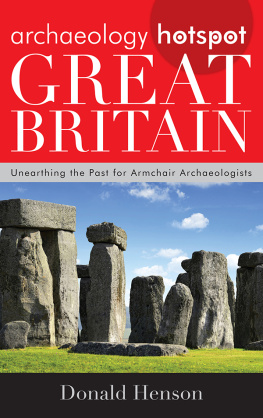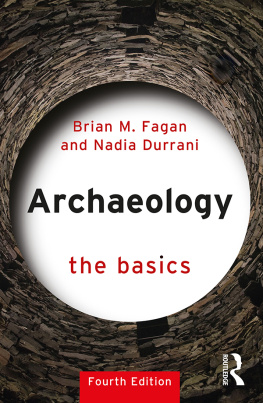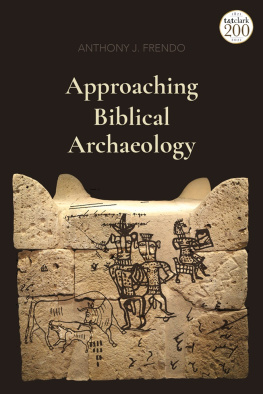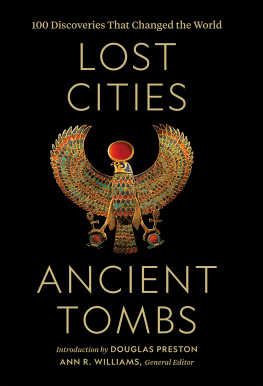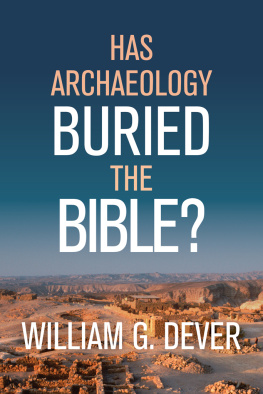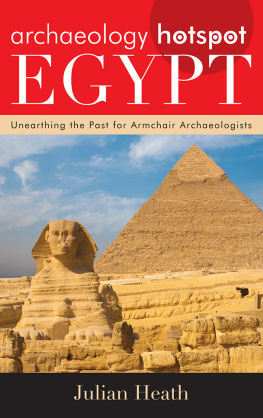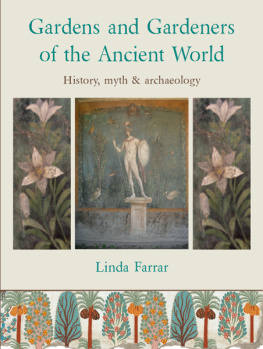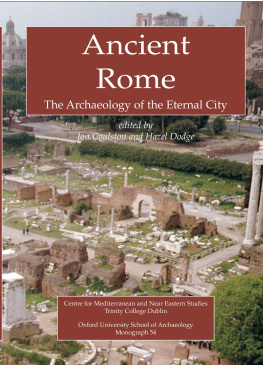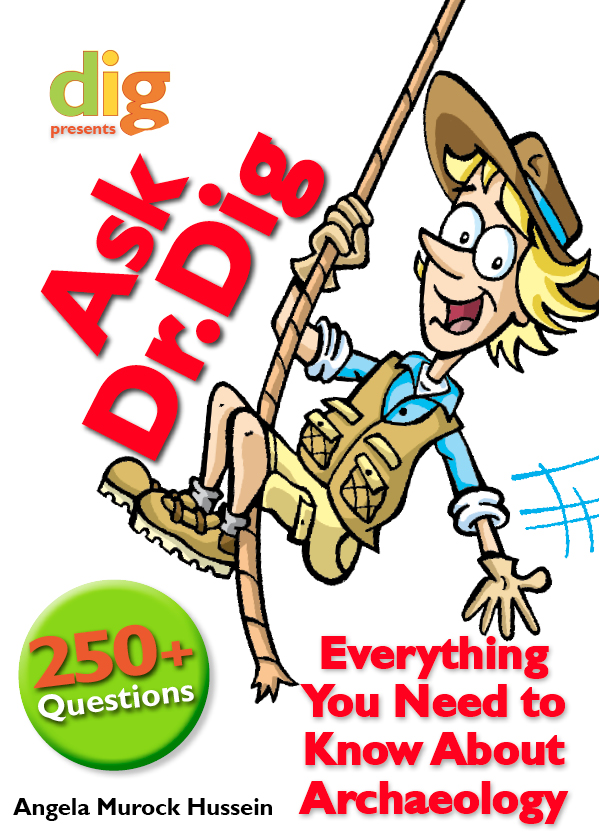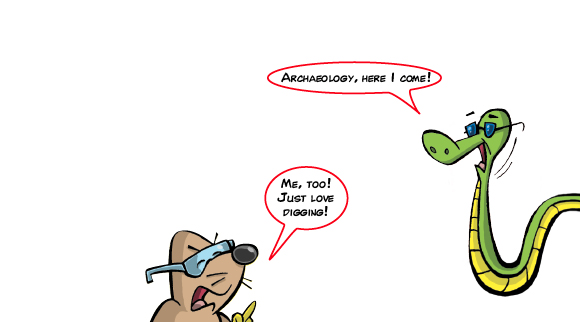When people hear what I do for a living, the reply is often, Youre an archaeologist? I always wanted to be one when I was a kid. And, I always respond the same way, Me, too. In fact, there is a lot about being an archaeologist that is appealing to kids. You travel to different places, often having adventures to rival those in movies or TV shows. No one ever tells you that you are getting too dirty. You get to touch the stuff that is usually behind glass or velvet ropes in museums. In fact, kids make good archaeologists because being curious is a job requirement.
As Dr. Dig, I answer questions from kids about archaeology. It is something I really enjoy because it is a way to share what I find fascinating with people who are enthusiastic and interested. The questions are often about facts: How did people long ago make or do that? How big was this? How long ago did that happen? How can you tell how old something is? When you tell kids the answers, it really helps them to imagine a world that is larger and more amazing that they ever thought. Other questions are about why ancient people did what they did. This shows that kids are thinking about points of view that are different from their own.
I am glad to know that people, especially young people, are interested in knowing about the past. I believe that if we can piece together the story of ourselves as humans, we will benefit greatly. Knowledge of the past teaches us to appreciate human achievement and helps us to learn from human mistakes. It also increases our respect for human life in all its diversity and ingenuity. In addition, an interest in the past clearly reflects a persons hope to preserve knowledge for future generations.
Archaeologists Say
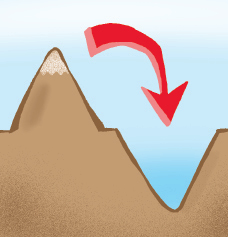
How do ancient cities become buried? Why are they so far down?
Ancient peoples built their cities at ground level (on top of the land) as we do today, although sometimes their basement rooms were dug into the soil. The cities that have survived have done so because they were in some way protected. This usually means that they were buried, either by many layers of wind-blown sand and dirt or by later cities built directly on top of the older ones. The easiest cities to excavate are those that are simply covered with dirt. The more complicated cities are those, such as ancient Rome, where the ancient remains are covered by many layers of later buildings.
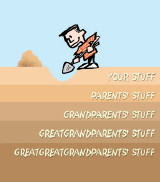
Why do things that you dig go deeper underground every year they are underground?
It is not that the things go more underground but, rather, that the top of the ground moves up. Picture it like this: If you drop a pebble into a bucket, it can only go as far as the bottom of the bucket. If you drop more and more pebbles, they eventually stack on top of each other until it is full. But the ones at the bottom were dropped before the ones in the middle and the ones in the middle were dropped before the pebbles on top. When you dropped the pebbles, they could fall only as far as the top layer of pebbles that was in the bucket before them. These are like archaeological layers. Dirt, structures, and artifacts usually are deposited at the level where the ground was at the time. Later, as things piled up, the ground level moved up.
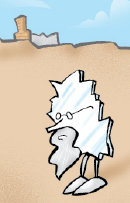
What will be left of my house 1,000 years from now?
The fate of your house depends, to a great degree, on where you live. Lets assume that you dont live near the sea (where there is a danger of erosion, high winds, and salt damage) and that you have a moderate amount of rainfall each year. Lets also assume that no one will repair or maintain your house and that all water, electricity, and gas supplies are cut off. The problems would start with the organic materialsin particular, the wood used for flooring, roof beams, and window and door frames. After a few decades, this wood would be completely rotten, and the windows, floors, and ceiling would fall in. This would let rain and snow into the house shell, speeding up the decay process. Meanwhile, the standing brick walls would become unstable, and, as the weather slowly eroded the mortar between the bricks, the walls would eventually collapse until they stood maybe six feet tall. The surviving walls would then be protected by the fallen rubble. Metals within the house structure would rust and erode, and concrete would be broken up by weathering and weed growth. As soil accumulated around your house, you would eventually end up with a small, weed-covered mound. Bricks might disintegrate depending on soil conditions, but glass shards and plastic are likely to be preserved.
Will our garbage be considered an artifact of civilization?
Yes, garbage would definitely be considered an artifact of civilization, and a very valuable one, too. Archaeologists learn a lot from examining the things that people throw away. Anything that has been made, or used to make something, would be considered an artifact.

What keeps fossils preserved?
Fossils are the remains of long-dead plants and animals. Some fossils are many thousands of years old, others are many millions of years old. The fossil plant or animal is preserved when, after death, it is covered in mud, silt, or sand, which protects it from the environment. Gradually, over the years, permineralization occurs. This means that the minerals that dissolved in the water pass into the skeleton or shell until it becomes stone. When it is discovered, the fossil looks like the living plant or animal, but is actually rock. For this reason, it does not need any further preservation.
How do you know whats true about what you dig up?
In archaeology, we try to be as scientific as we can. This means that according to the scientific method, we ask a question and propose an answer, and then we try to find information that proves whether what we think is true or not. Lets say we believe that the city of Rome was founded in 753 B.C. because thats what the ancient legends say. We would excavate. If we find artifacts that date to earlier than 753, we would have to revise our theory. This is what is happening in archaeology all the time.
Why do people lose their skin after they die?
The bodies of living people like you and me are always making new skin and healing from cuts and scrapes. But when people die, their bodies stop making anything new. The skin on their bones eventually gets dried out or rots away, just as plants do in winter. Bones are much harder than skin, so they dont rot away as fast. That is why when people have been dead for a while, all that is usually left is a skeleton.


